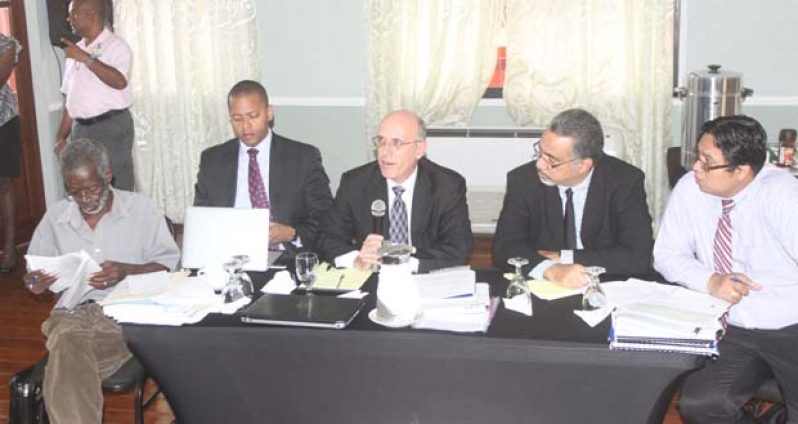MR. JOHN Audet, Vice-President (Finance) of the Guyana Telephone and Telegraph Company (GT&T)’s parent company, Atlantic Telecommunications Network (ATN), yesterday defended GT&T’s request for an increase in landline rates.
In defence of the company’s request, Audet stressed that despite increased costs due to inflation in recent years, the company’s rates for the local landline service had not changed since 2002.
He emphasised that GT&T’s application for increased rates was not “only” about raising rates on some services, but was about lowering rates as well, disclosing that GT&T was proposing reductions of – on average 50-60% – in tariffed rates for international long- distance calls.
He made the arguments during a hearing of the Public Utilities Commission (PUC) on GT&T’s request for increased landline rates.
The Guyana Consumers Association (GCA) is saying that there is no justification for the increased rates.
In his submission yesterday, Mr. Audet said that since the last increase in rates in 2002, inflation had increased GT&T’s costs for goods and services purchased in Guyana by 90% as measured by the Guyana Bureau of Statistics.
He said that during the period also, the Guyana dollar depreciated against the US dollar by 9%, and recently there has been much more variability and increasing currency devaluation.
He said too that wire line dial-tone telephone services had attracted financial losses due to inflationary forces impacting the direct and overhead costs needed to provide the product.
Add the effect of currency deflation, since the capital equipment required to maintain the network must be purchased with hard currency, and the result is that a service which was originally priced below cost, now has greatly increased losses. “This is basic arithmetic,” he added.
He charged, too, that the rental charge for dial-tone telephone service (the monthly recurring charge) is 13 times less than that charged by rural telephone companies in the United States.
“The current landline rate in Guyana is still four to seven times less the current rate in the Caribbean,” Audet said, adding:
“There can be no argument; no debate at all; that GT&T dial-tone telephone service is priced below cost. Again, this is basic arithmetic.”
He said that the threshold rate of return agreed between GT&T and the Government to ensure continued availability of the local service was 15% and the PUC was bound by the law to allow GT&T to earn its contractually committed rate of return on all capital dedicated to public use.
“Since our proposed new rates do not result in a prospective rate of return in excess of 15%, the Commission is obliged to approve our tariff,” Audet said.
The PUC, on the other hand, argued that the rate of return over the past 11 years averaged about 19.84%, which is more than the 15% minimum returns limit that was granted to GT&T.
The PUC also noted that although for the past four years GT&T has seen a drop in their percentage of returns, mainly because of competition from other companies, the average percentage of returns still remains over the 15%, which the PUC felt was more than fair enough once they receive adequate returns.
Audet said he found it strange that the PUC received such figures, because according to him only once could he recall the company receiving over 15% returns.
On that note, the PUC adjourned the hearing until October 21, so as to allow GT&T to look over the figures, and to formally respond to a memo sent to GT&T by the Guyana Consumers Association (GCA).
(By Clifford Stanley and Navendra Seoraj)



.jpg)










